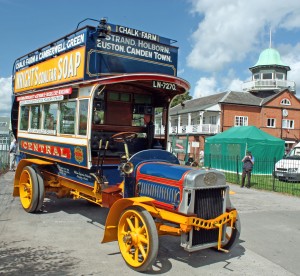RTHA Autumn Conference 2022
The RTHA 2022 Autumn Conference on Saturday 8 October has been changed from face to face to a Zoom meeting. See the Events page for details.
RTHA AGM and Spring Conference 2022
The RTHA 2022 Annual General Meeting and Spring Conference will take place on Saturday 23 April on Zoom. See the Events page for details.
Wales on Wheels 2022
Wales on Wheels was cancelled in 2020 and 2021 for reasons evident to all of us. WoW 2022 is booked for Sunday 15 May and promises to be bigger and better than ever. See the Wales on Wheels page for details.
RTHA Journal Archive
The Journal Archive page will be updated shortly with the latest issues. Newsletters and Journals from issue 1 have been digitised and are in the Archive..
The Road Transport History Association
The Roads & Road Transport History Association, founded in 1992, promotes, encourages and co-ordinates the study of the history of roads, road passenger transport and the carriage of goods. In 2005, the Association became a Company Limited by Guarantee.
We cover the whole range of transport history from the earliest times to the current age … packhorses, carters, street furniture, economics, social trends, the effects of gender upon transport, personalities in road transport, avenues of research, regulation by governments or local authorities, manufacturers and bodybuilders, cycling, sources of transport history, the preservation of artefacts, photographic material, the exploration of archives, the need to promote transport and logistics as a career, a general, boundless interest in transport, and even quite simple nostalgia.
This breadth of interests contributes to valuable cross-fertilisation. We aim to encourage those interested in a particular aspect of transport, to understand their chosen subject in the context of developments in other areas and at other periods.
Change of Association Name
Previously known as the Roads and Road Transport History Association, the 2017 AGM approved the name change to Road Transport History Association.
We advise members that this change does not demote our interest in roads – it merely simplifies our title.
All roads remain an integral part of our interests – as well as the transportation modes using them. From Roman roads, turnpike roads and toll bridges to developments in smart motorways, please be assured that our focus has not changed.
Registered Office: The Kithead Trust, De Salis Drive, Hampton Lovett, Droitwich Spa, WR9 0QE.


Splendid layout and lively text. Bob McCloy
I’m a retired journalist, seeking to confirm a bus accident in Oldham in or about 1959. The information I have is sketchy, only that a young lad (probably under 6 years old), named Michael Taylor, was apparently killed when struck by a bus as he crossed a street. Michael was from Oldham. Are there accident records held by the bus company, dating back that far? I understand Oldham Corporation Transport was the bus company at that time. I am not living in England, and it would not be convenient for me to search actual newspaper library records. Any assistance or suggestions would be greatly appreciated.
Dear,
I am a Brazilian journalist. I am writing an article at our website explaining “Why do Brits drive on the left side of the road?”. Can anyone at the RRTHA please answer me a few questions by phone or by email about it?
I am planning to publish it at the end of the month.
My questions bellow:
1. Did Ancient British walk on the left side of Roman roads? How can we know it?
2. Did Ancient British used to carry swords while walking on the roads?
3. Were armed conflicts usual on Roman roads in Britain? Do you have examples of it?
4. Do Brits drive on left today because Ancient Brits should be ready to use the sword in case of a fight? http://mentalfloss.com/article/501958/why-do-people-uk-drive-left-side-road
5. Anything else you would like to add?
Thank you and best regards.
Dear Eduardo
Thank you for your enquiry.
The website below gives more historical detail that you one you quote and reinforces the idea of the right-hand being free for swords. (https://www.worldstandards.eu/cars/driving-on-the-left/ )
I don’t know about the Ancient Britons marching armed like this but the Roman invaders would have done so on occasion. (See: https://www.quora.com/On-long-marches-did-the-soldiers-in-a-Roman-legion-really-wear-their-full-armor-Or-was-the-heavy-gear-transported-by-wagons). However, that would not explain why Italy as a modern nation chose to drive on the right.
Roman roads would have been quite narrow (by today’s standards). I would imagine that soldiers marched down the middle. If they had to give way to an oncoming march, I don’t know which side they would move to. The blog below might help:
http://www.romanarmytalk.com/thread-18.html
I hope that this information helps, Eduardo.
Best wishes
Rod Ashley (Chair)
Your articles on north Lincolnshire operators of buses
My grandfather Cyril Tindall of Ashby cum fenby ran buses from there to Grimsby and Louth u to the late 50s
A s a stage licence from cleethorpes to Scunthorpe on a a daily basis with a express licence with steel workers
During the war he had Bedford o b utility vehicles which I can remover in use up to the 50s
During the thirties workers had been taken to airfield builders in the area
Which carried on into my school days
The buses also used on tours school and excursions
Thank you, Paul for your comments.
That is very interesting about the steel and airfield workers in Lincolnshire. There were, of course, many airfields built there in the 1930s. In fact, my brother bought the Brookenby station commander’s house a few years ago and is refurbishing it. Apparently, on the top floor is a cine projection room where officers would be briefed on forthcoming air raids.
I also remember the Bedford OBs into the 1950s, used by Wessex Coaches in Bristol, also used for Sunday School outings..
Best wishes
Rod Ashley (Chair)
Thanks for reply
We operate many old vehicles in preservation by no buses
Keep up the good work